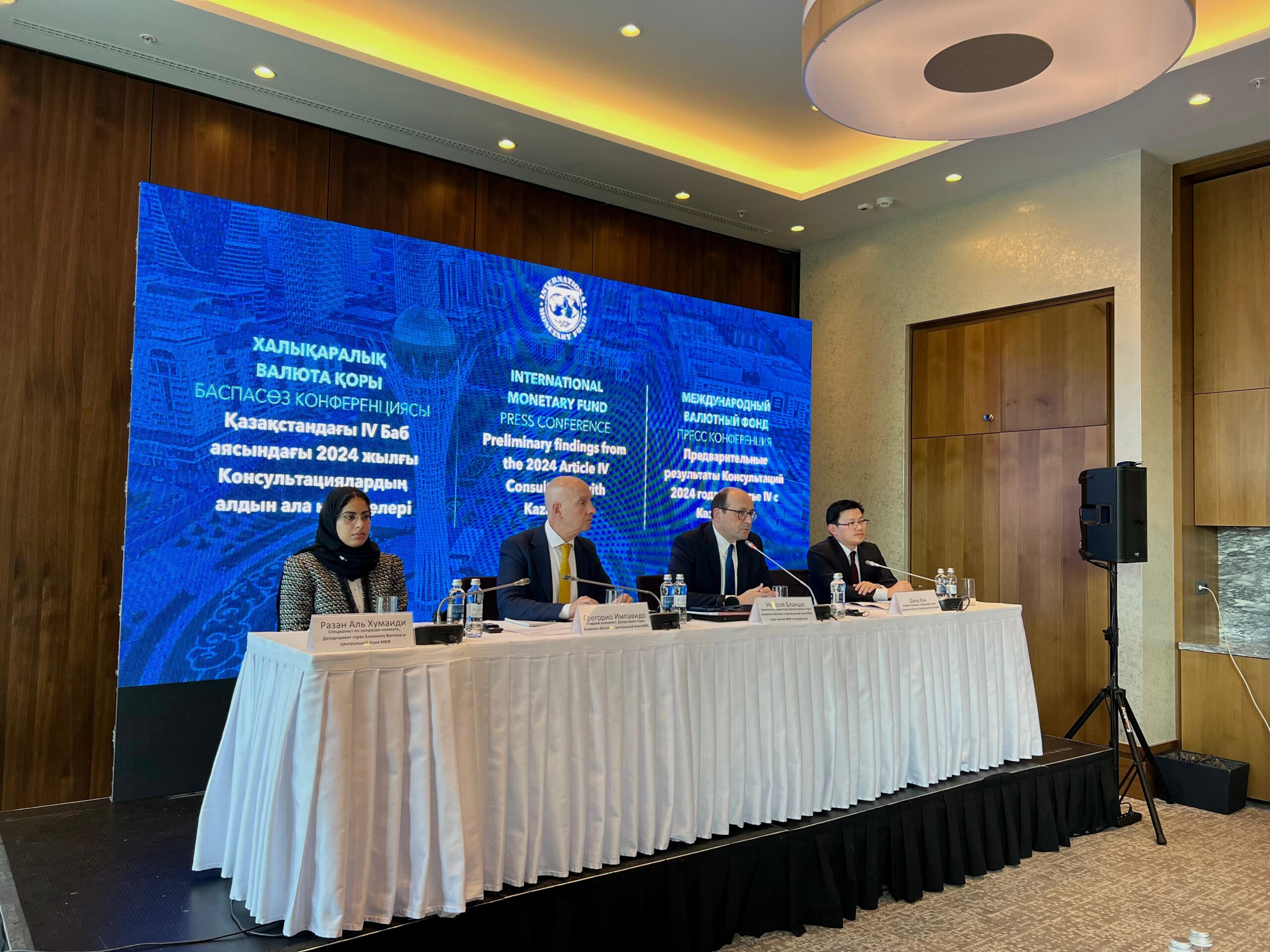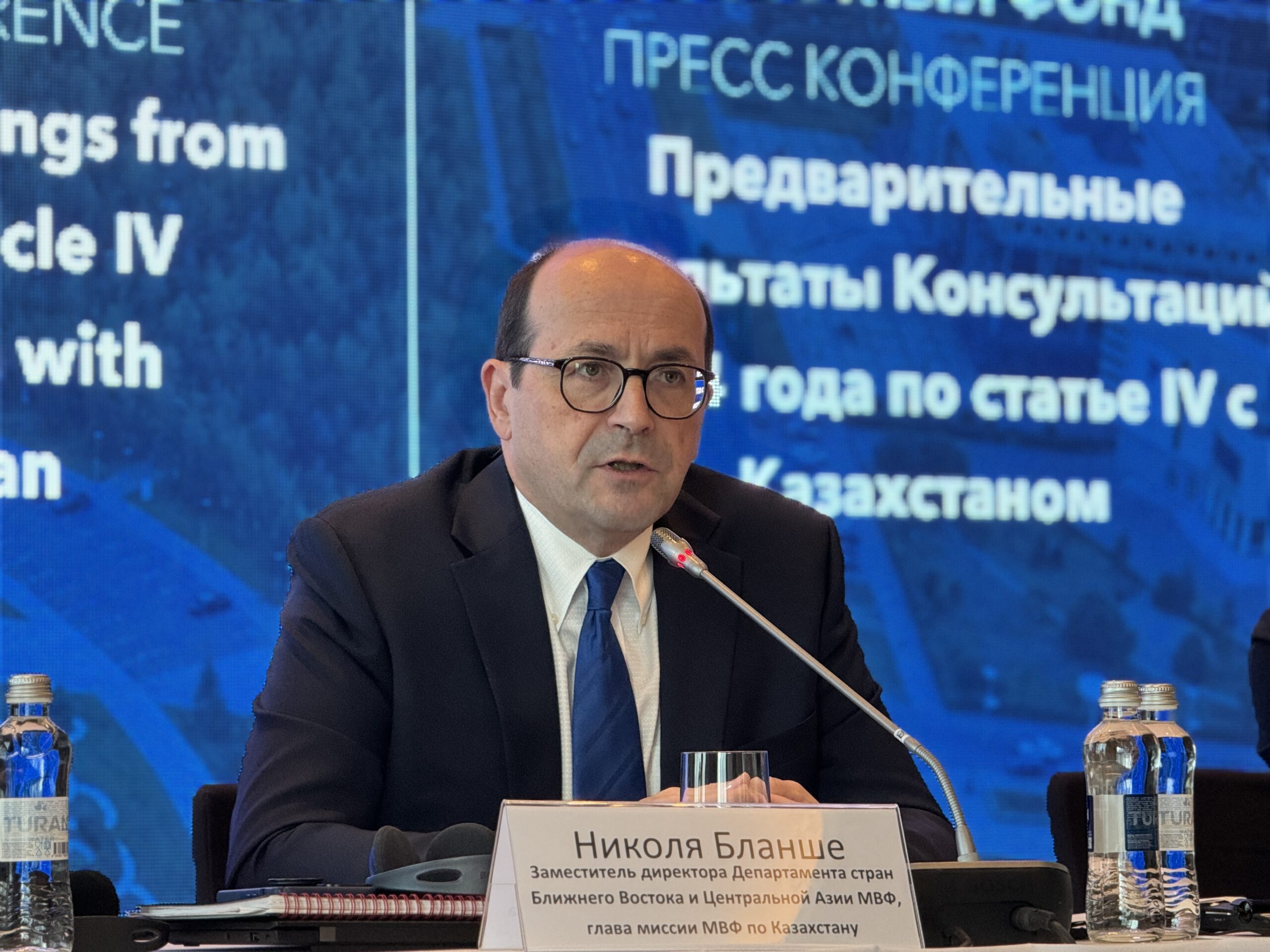ASTANA – The International Monetary Fund (IMF) hosted a press conference on Oct. 1 in Astana, presenting the preliminary findings of the Article IV consultations with Kazakhstan. While noting the resilience of the economy, IMF calls the government of Kazakhstan to take bolder reforms and enhance fiscal performance.

IMF conducts Article IV consultations annually. The final assessment is expected by late November. Photo credit: Aida Dosbergenova/ The Astana Times
Article IV consultations refer to the regular reviews conducted by the IMF with its member countries to assess their economic health and policies. These consultations are named after Article IV of the IMF’s Articles of Agreement, which mandates the IMF to oversee the international monetary system and promote stability by monitoring the economic and financial developments of its member states.
A window of opportunity
The IMF team, led by head of IMF Mission in Kazakhstan Nicolas Blancher, recently concluded a two-week mission in Kazakhstan.
“We see that economy has been robust and inflation has declined gradually this year. We project a growth level of 3.9% for 2024 driven, in large part, by higher public spending. Inflation, as you know, has declined to 8.4% in August. This is obviously a very welcome development,” said Blancher, as he addressed a room of journalists.

Nicholas Blancher. Photo credit: Assel Satubaldina/ The Astana Times
Looking ahead, IMF expects economy to accelerate in 2025 because of higher plans for oil output.
“That will be driving growth, in our view, closer to 5%. In the medium term, however, we do see growth to stabilize, especially non-oil growth, which is irrespective of the ups and downs of oil prices. We expect that non-oil GDP growth to stabilize around 3.5%,” he said. Risks still remain elevated, he noted, affecting the country’s economic trajectory.
Blancher described Kazakhstan’s current economic situation as a “window of opportunity.” With economic stability, declining inflation, and political stability, the country is well-positioned to “fix the roof while the sun is shining” by implementing bold reforms to prepare for future challenges and boost growth, job creation, and sustainability.
Need for better fiscal performance
In its consultations with Kazakhstan, the IMF highlighted concerns regarding the country’s fiscal policies, particularly the recurrent fiscal underperformance seen in 2023 and expected to continue into 2025. “This is a problem in various respects,” said Blancher, noting the need for improved budget planning and more realistic revenue projections to avoid shortfalls in tax collections.
“In general, we think it is also a result of the insufficient level of non-oil public revenues, which is why we are very supportive of the new Tax Code, which is being discussed currently, and which is a major opportunity to implement reforms to elevate that level of non-oil revenues,” he explained.
Blancher expressed IMF’s strong commitment to support Kazakhstan in this effort. He commended the government’s proposal to eliminate tax exemptions and supporting the idea to raise the value added tax rate level. The adoption of the Tax Code has been postponed to 2025 after President Kassym-Jomart Tokayev’s directive in his September state-of-the-nation address.
Another significant issue, according to the IMF, is Kazakhstan’s heavy reliance on the National Fund, which has increasingly been used to finance budget deficits.
The National Fund is a sovereign wealth fund established in 2000. Its primary purpose is to accumulate and manage oil revenues and other resource-based revenues to ensure macroeconomic stability, reduce dependence on oil, and ensure that the wealth from natural resources benefits future generations.
However, it has come under criticism including from the country’s leadership and expert community. “The role of the National Fund is not to finance annual budget deficits. It is much more to be part of long term strategic allocation of public resources for future growth, for education and infrastructure and the things that will support the economy for future generations,” said Blancher, expressing concern over how this practice creates inflationary pressure.
The IMF urges Kazakhstan to take “urgent corrective action” to strengthen the transparency and rules-based nature of its fiscal framework. IMF is providing technical assistance to improve public finance data and align statistics with international best practices, ensuring that fiscal activities are fully accounted for in the national budget and subject to parliamentary oversight.
Resilient financial sector
Blancher welcomed the efforts of the government to strengthen financial sector. He referenced the Financial Sector Assessment Program (FSAP) conducted last year by the IMF and the World Bank. The assessment, which provided an in-depth review of the system, concluded that the sector remains resilient.
“Not only that, but also the authorities have implemented a roadmap, which was adopted in December last year, and that now is being rolled out. This leads to improvements that we already observed in terms of the quality of financial supervision, in terms of the improvement on data that need to be developed to better identify the risks. It has also led to very important efforts to strengthen what we call the macro prudential mandate of the National Bank,” Blancher explained.
He said IMF observes significant efforts in the development of a robust framework for resolving distressed banks, a crucial step to avoid costly public bailouts.
“Kazakhstan has a history of costly situations like this, where the the treatment of those banks cost a lot of money to the public sector. All of this framework, which is again in line with best practices, will be precisely to avoid reliance on public money. This is a big legal effort at encouraging collaboration between the Agency on Financial Regulation in Almaty, but also with the National Bank of Kazakhstan, with the government ministries,” he said.
Bolder structural reforms are needed
When it comes to structural reforms, progress has been slow. Blancher emphasized the need for more decisive reforms in Kazakhstan to achieve the country’s ambitious growth targets of 6% by 2029 as outlined by the President.
“We think 6% is achievable,” said Blancher, but cautioned that bold reforms are required. “We have been discussing with a lot of counterparts. We don’t see those reforms happening in a way that permits 6% in the coming years. This is a concern.”
A key area where reforms are needed is reducing the role of the state in the economy, not only in terms of state ownership of enterprises but also in minimizing state interventions such as subsidies.
“The fundamental engine for future growth that we see is competition. At the end of the day, you want a competitive environment where the private sector can thrive. That is what drives growth across the world. In history, the East Asia miracle was really driven by private sector dynamism. The same could happen in Kazakhstan, which has a lot of resources potential,” said Blancher.
The IMF also pointed to Kazakhstan’s need to adapt to global decarbonization trends. With the oil sector facing long-term transition risks, the IMF advocated for increasing Kazakhstan’s carbon price, currently one of the lowest in the world at around $1 per ton. “Raising the carbon price will incentivize the private sector to invest in new sectors of the economy beyond fossil fuels,” the representative noted, adding that this could unlock significant revenue gains for the government to support infrastructure and renewable energy investments.
“The private sector will be incentivized by higher carbon price to invest in new sectors of the economy than fossil fuel. That will create activity and jobs. Of course, the public sector also has important roles to play in that, including, as I mentioned, infrastructure, education, and reskilling labor force,” he said.
In terms of social responsibility, the IMF emphasized that the state must protect vulnerable communities affected by the economic shift away from fossil fuels through social transfers, education, and reskilling programs. “The resources would be available if these reforms are implemented,” he added.
The final assessment and staff report will be reviewed by the IMF’s executive board by late November.
